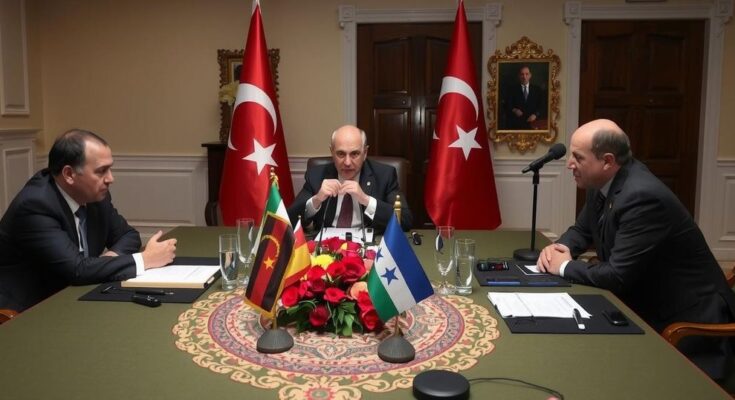Egypt’s President Al-Sisi advocates for Syria’s unity and political inclusivity as Turkey calls for international aid for reconstruction. The Syrian Negotiation Commission emphasizes transitional justice, while Russia and the UN highlight the importance of maintaining state institutions and securing humanitarian aid. France’s recent diplomatic engagement signals a move towards potential political transition in Syria, as the international community remains focused on addressing ongoing challenges.
Egyptian President Abdel Fattah Al-Sisi has underscored the significance of maintaining the unity and territorial integrity of Syria. This assertion was made during a phone conversation with Cypriot President Nikos Christodoulides, wherein Al-Sisi advocated for the initiation of a thorough political process that encompasses all factions of the Syrian populace. Concurrently, Turkish President Recep Tayyip Erdoğan expressed the need for international collaboration to facilitate Syria’s reconstruction following the ousting of former President Bashar Al-Assad’s regime. In a meeting with Qatari Emir Sheikh Tamim bin Hamad Al Thani, Erdoğan proclaimed, “Turkey is combating terrorist organizations to protect its national security and end the state of instability in Syria as quickly as possible.”
Bader Jamous, the head of the Syrian Negotiation Commission, characterized transitional justice as “not an option but a necessity,” emphasizing the importance of holding accountable the prior regime and President Al-Assad. During a session of the UN Security Council focused on Syria, Jamous reiterated that the framework of Security Council Resolution 2254 should serve as a guide for fulfilling the ambitions of the Syrian people. He called for a comprehensive national transitional government representing all demographics and for an inclusive national conference to devise a new constitution, ensuring that “free and fair elections should be organized under the supervision of the United Nations after the referendum on the constitution.”
On the international front, Russia’s UN envoy Vasily Nebenzya reported military developments near Damascus, urging the preservation of state institutions within Syria and advocating for the removal of sanctions. UN Special Envoy Geir Pedersen stressed the necessity of tangible progress toward an inclusive political transition to garner economic support for Syria. Furthermore, Tom Fletcher, the UN Under-Secretary-General for Humanitarian Affairs, reported that a considerable portion of the Syrian population is in dire need of assistance, citing severe shortages of basic necessities and alarming displacement figures.
In a notable diplomatic effort, France’s Ministry of Foreign Affairs announced that its envoy had engaged with representatives of the Syrian transitional authorities, reiterating the need for an all-inclusive political transition. France also raised its flag over its embassy in Damascus, signaling a degree of re-engagement with the country, albeit without a full reopening of the embassy. Paris remains steadfast in its position that any political progression within Syria must be both credible and inclusive in accordance with UN stipulations.
The ongoing conflict in Syria, which began in 2011, has led to significant political and humanitarian crises, including widespread violence and the displacement of millions. The international community remains deeply concerned over Syria’s future, with various nations adopting positions that reflect their geopolitical interests. Amid these tensions, calls for a political resolution are becoming increasingly urgent, highlighting the necessity for cooperation among regional and global powers to arrive at a sustainable solution. The situation is further complicated by the presence of multiple armed factions and foreign military interventions, particularly from Russia and Turkey, which have their own strategic goals in the region. As calls for reconstruction and unity resonate, international dialogue and adherence to UN resolutions such as Security Council Resolution 2254 play critical roles in shaping Syria’s recovery process. These discussions focus on transitional justice, inclusive governance, and humanitarian aid without neglecting the pressing security concerns related to terrorism and stability, especially in light of Turkey’s ongoing military operations against Kurdish groups identified as terrorist organizations.
In summary, the current discourse surrounding Syria’s future emphasizes the crucial need for unity and an inclusive political process. President Al-Sisi’s call for territorial integrity aligns with Turkey’s push for reconstruction, while the Syrian Negotiation Commission seeks accountability through transitional justice. International entities, including the UN, are actively engaging in efforts to support a political transition that addresses the humanitarian crisis affecting millions of Syrians. France’s diplomatic re-engagement indicates a potential shift in international relations with Syria, although challenges remain in reaching a sound resolution that reflects the aspirations of the Syrian people, while also ensuring regional stability.
Original Source: www.dailynewsegypt.com




